![]()
![]()
![]()
Use LEFT and RIGHT arrow keys to navigate between flashcards;
Use UP and DOWN arrow keys to flip the card;
H to show hint;
A reads text to speech;
69 Cards in this Set
- Front
- Back
|
Discuss Classical conditioning:
|

|
|
|
Discuss operant conditioning (4 kinds):
|

|
|
|
Discuss transference and countertransference:
|

|
|
|
Discuss Ego defenses:
acting out-- dissociation-- denial-- displacement-- fixation-- identification-- isolation of affect-- projection-- |
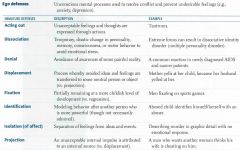
|
|
|
Discuss Ego defenses:
rationalization-- reaction formation-- regression-- repression-- splitting-- |
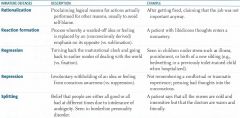
|
|
|
Discuss mature defenses:
|

|
|
|
Discuss Infant Deprivation Effects:
|

|
|
|
Discuss child abuse--physical and sexual:
Evidence-- Abuser-- Epidemiology-- |

|
|
|
Discuss child neglect:
|

|
|
|
Discuss childhood and early-onset disorders: (5)
|
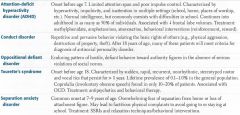
|
|
|
Discuss pervasive developmental disorders: (4)
|
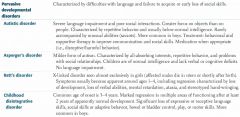
|
|
|
Discuss neurotransmitter changes with disease:
anxiety-- depression-- AD-- HD-- schizophrenia-- PD-- |

|
|
|
Discuss patient orientation:
|

|
|
|
Discuss amnesias? 4 kinds
|

|
|
|
What is a cognitive disorder?
|

|
|
|
Discuss delirium:
|
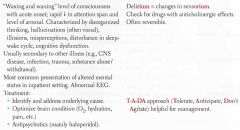
|
|
|
Discuss dementia:
|
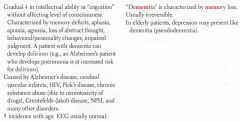
|
|
|
What is a psychotic disorder?
|
A distorted perception of reality (psychosis) characterized by delusions, hallucinations, and/or disorganized thinking.
Psychosis can occur in patients with medical illness, psychiatric illness, or both. |
|
|
Signs of psychosis:
Discuss 3-- |

|
|
|
Define types of hallucination: 7
|

|
|
|
Discuss schizophrenia:
|
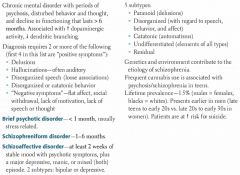
|
|
|
Discuss delusional disorder:
|

|
|
|
Discuss dissociative disorders: (3)
|

|
|
|
Discuss mood disorder:
|

|
|
|
Discuss manic episodes:
|

|
|
|
What's a hypomanic episode?
|
Like manic episode except mood disturbance is not severe enough to cause marked impairment in social and/or occupational functioning or to necessitate hospitalization. No psychotic features.
|
|
|
Discuss bipolar disorder:
|

|
|
|
Discuss Major depressive disorder:
|
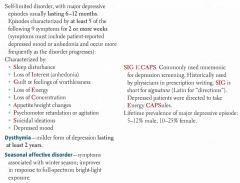
|
|
|
Discuss atypical depression:
|

|
|
|
Discuss postpartum mood disturbances:
|

|
|
|
Discuss ECT:
|

|
|
|
Discuss risk factors for suicide completion:
|

|
|
|
Discuss anxiety disorder:
|

|
|
|
Discuss panic disorder:
|

|
|
|
Discuss specific phobias:
|

|
|
|
Discuss OCD:
|

|
|
|
Discuss PTSD:
|

|
|
|
Discuss Generalized Anxiety Disorder:
|

|
|
|
Discuss malingering:
|

|
|
|
Discuss factitious disorder: 2 kinds
|

|
|
|
Discuss somatoform disorders: 5 kinds
|

|
|
|
What's a personality trait?
What's a personality disorder? |

|
|
|
Discuss the Cluster A personality disorders:
3 kinds-- |

|
|
|
Discuss the Cluster B personality disorders:
4 kinds-- |
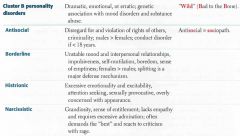
|
|
|
Discuss the Cluster C personality disorders:
3 kinds-- |

|
|
|
Discuss schizoid vs. schizotypal vs. schizophrenic vs. schizoaffective:
How to keep types of "schizo" straight? |

|
|
|
Discuss eating disorders: 2 major ones--
|

|
|
|
Discuss gender identity disorder:
|

|
|
|
Discuss substance dependence:
|

|
|
|
Discuss substance abuse:
|

|
|
|
Stages of change in overcoming substance addiction:
|

|
|
|
Discuss Psychoadive drug intoxication and withdrawal for depressants: (4)
|
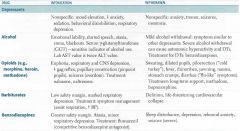
|
|
|
Discuss Psychoadive drug intoxication and withdrawal for stimulants: (4)
|
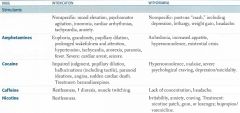
|
|
|
Discuss Psychoadive drug intoxication and withdrawal for hallucinogens: (3)
|
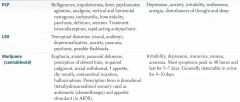
|
|
|
Discuss heroin addiction:
|

|
|
|
Discuss alcoholism:
WKS: Mallory-Weiss syndrome: |

|
|
|
Discuss delirium tremens:
|

|
|
|
Treatment for selected psychiatric conditions:
|
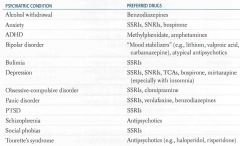
|
|
|
3 examples of CNS stimulants:
Mechanism and clinical use of CNS stimulants: |

|
|
|
Antipsychotics: 5 examples--
Mechanism-- Clinical use-- Toxicity-- Other toxicities-- |
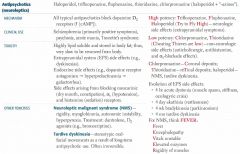
|
|
|
Atypical Antipsychotics: 6 examples--
Mechanism-- Clinical use-- Toxicity-- |

|
|
|
Lithium:
Mechanism-- Clinical use-- Toxicity-- |
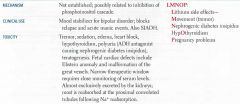
|
|
|
Buspirone:
Mechanism-- Clinical use-- |

|
|
|
Diagram of sites of action of antidepressants:
|
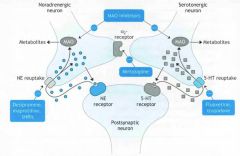
|
|
|
SSRIs:
Mechanism-- Clinical use-- Toxicity-- |

|
|
|
SNRIs:
Mechanism-- Clinical use-- Toxicity-- |

|
|
|
Tricyclic antidepressants:
Mechanism-- Clinical use-- Toxicity-- |

|
|
|
MAO inhibitors:
Mechanism-- Clinical use-- Toxicity-- |

|
|
|
Atypical antidepressants: discuss 4 of them--
|
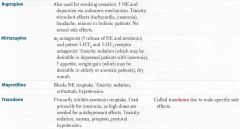
|

